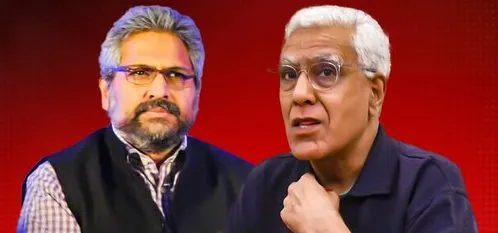New Delhi, Aug 19: The Editors Guild of India (EGI) has come out strongly in defence of senior journalists Siddharth Varadarajan, Founding Editor of The Wire, and Karan Thapar, Consulting Editor of The Wire, after the Assam Police registered FIRs accusing them of “endangering the sovereignty of India.” The Guild demanded immediate withdrawal of FIRs against Thapar and Varadarajan.
The Guild in a statement expressed deep concern over media reports that the Assam Police have summoned two senior journalists – Siddhart Varadarajan, Founding Editor of The Wire, and Karan Thapar, Consulting Editor of The Wire – to Guwahati following the registration of a First Information Report (FIR) against them for allegedly endangering the sovereignty of India.
The summons to these two journalists to appear before the Crime Branch office in Guwahati’s Panbazar on August 22, 2025, comes just days after the Supreme Court granted Varadarajan and others protection against any “coercive action” by the Assam Police in connection with another FIR lodged over an article published by The Wire, the statement said.
It is not yet clear whether the latest FIR is also linked to the same article, which critiqued the government over Operation Sindoor, it said.
It also said that as with the earlier FIR registered at Morigaon Police Station, the latest case also invokes Section 152 of the Bharatiya Nyaya Sanhita (BNS), which pertains to acts endangering the sovereignty, unity and integrity of India. In addition to Section 152, the FIRs invoke several other provisions: Section 196 (communal enmity), Section 197 (1)(d)/3(6) (false propaganda), Section 353 (public mischief), Section 45 (abetment), and Section 61 (criminal conspiracy).
The Guild is extremely disturbed by this continuing trend of law enforcement agencies across states registering FIRs against journalists by invoking multiple provisions of the criminal code. This practice effectively muzzles independent journalism, as the very process of responding to notices, summons and prolonged judicial proceedings becomes a form of punishment, the statement highlighted.
It added that the invocation of Section 152 of the BNS is particularly troubling, since it is widely regarded as a repackaged versions of the draconian sedition law (Section 124A of the IPC), which the Supreme Court ordered to be kept in abeyance in May 2022 in response to petitions filed by the Guild and others challenging its constitutionality. Rather than meaningfully engage with the concerns raised by the Court, the government reintroduced the provision in broader form under the new law. Section 152 of the BNS now extends beyond speech acts (written or oral) to also include the alleged use of financial means to pursue certain objectives.
The Guild had written to the Home Ministry in July 2024 highlighting these concerns, specifically regarding Section 152 and other provisions that pose a serious risk of misuse against free speech. It had also urged the introduction of procedural safeguards to prevent the arbitrary application of such laws against journalists in the course of their professional work, it added.
While laws must always be respected and upheld, they must not be misused to suppress journalism. The Editors Guild urges the Assam Police to refrain from actions that could cast even the slightest doubt on their true intent. The Guild also takes the opportunity to remind fellow journalists about the importance of pursuing their profession without fear or favour. Honest journalism can never be a crime, the statement held.








